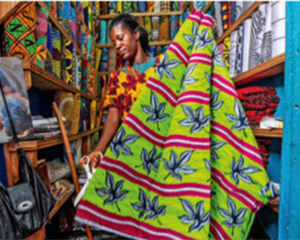The problem goes beyond mining. International supermarkets often truck in goods from distribution hubs—in South Africa, for example—rather than sourcing in the places where they operate. Much of Africa's coffee, cashew and cocoa leaves the continent in packaging made abroad. Garment-makers stitch together imported fabrics with imported zips and buttons.
這個問題超出了采礦的范疇。國際超市經常從分銷中心(比如南非)用卡車運送貨物,而不是在他們所經營的地方采購。非洲大部分的咖啡、腰果和可可都以國外制造的包裝離開了非洲大陸。服裝廠用進口的拉鏈和紐扣縫制進口面料。
Governments' attempts to nurture linkages show just how hard they are to create. Some are trying to set up clusters of knowledge in industrial parks. Raghav Pattar, an Indian, came to Hawassa Industrial Park in Ethiopia as the manager of a Chinese apparel factory. From there it was a short step to his current job as chief executive of Nasa Garment, the first Ethiopian-owned company there. These kinds of moves help skills and knowhow spread. But most Ethiopian firms "are not coming to the industrial park", says Mr Pattar. They struggle to get the loans and expertise that foreign firms can acquire abroad. In many countries the entrepreneurs who gain most from foreign investment are often those with existing connections, such as those of European or Asian descent.
各國政府為建立這種聯系所做出的努力表明了它的困難程度。一些公司正試圖在工業園區建立知識集群。印度人Raghav Pattar來到了埃塞俄比亞的阿瓦薩工業園區擔任一家中國服裝廠的經理。從那時起他就離美國國家航空航天局服裝公司首席執行官的職位僅剩一步之遙,這是該公司首家被埃塞俄比亞人所持有的公司。這些舉措有助于技能的傳播。但是大多數的埃塞俄比亞公司都“不會來工業園”,帕塔先生表示。他們很難獲得外國公司可以在海外收購的貸款和專業技術。在許多國家,從外國投資中獲益最多的企業家往往是那些有現有關系的人,比如有歐洲或亞洲血統的人。

Governments are also trying to foster links through "local content" rules, which require multinationals to procure locally to win licences. The focus needs to be on suppliers that add value, notes Judith Fessehaie of the International Trade Centre, a development agency, who has studied such policies in the southern African mining sectors, so that contracts do not go to importers with nothing more than "a briefcase and a desk". But the risk is that tough restrictions put foreign firms off setting up in a country altogether.
各國政府還試圖通過“本地內容”規則來促進聯系,這些規則要求跨國公司在當地采購來獲得許可證。發展機構國際貿易中心的朱迪思·費斯海研究了南部非洲采礦業的此類政策,他指出,重點應該放在能增值的供應商身上,這樣一來,合同就不會落到進口商的手里,他們手里只有“一個公文包和一張桌子”。但風險在于,嚴格的限制完全阻礙了外國公司在一個國家的設立。
Some hope that the market might create incentives to source locally, as consumers become more interested in the origins of the products they buy. "Our objective is to grow the Ghana ecosystem," says Keren Pybus of Ethical Apparel Africa, a British garment-sourcing company that has invested in a factory in Ghana. Ms Pybus imports fabric but wants one day to buy it locally. Foreign-owned brewers are switching from imported barley to homegrown grains, marketing beer-drinking as a patriotic act. But unless suppliers have the funds, capacity and expertise to take advantage of foreign linkages, such efforts will amount to small beer.
一些人希望隨著消費者對所購買產品的產地越來越感興趣,市場能夠創造出采購動機。“我們的目標是發展加納的生態系統,”Ethical Apparel Africa的克倫·皮布斯表示。Ethical Apparel Africa是一家英國服裝采購公司,已經在加納投資了一家工廠。皮布斯女士的布料來自進口,但她希望有一天能夠在當地購買。外資釀酒商正從進口大麥轉向國產谷物,把喝啤酒當作一種愛國行為來進行推銷。但是,除非供應商有資金、能力和專業知識來利用與外國的聯系,否則這些努力將是微不足道的。
譯文由可可原創,僅供學習交流使用,未經許可請勿轉載。











